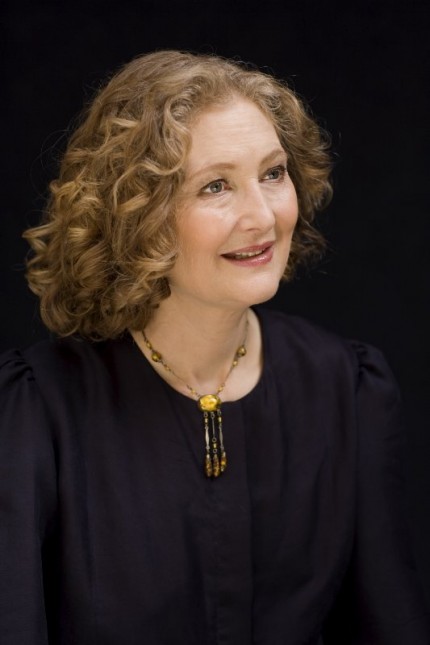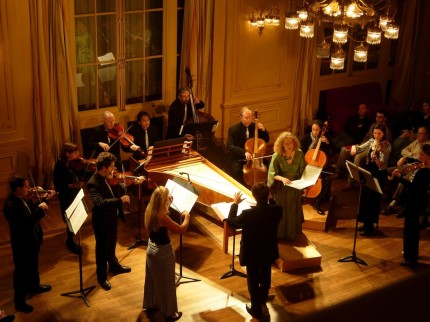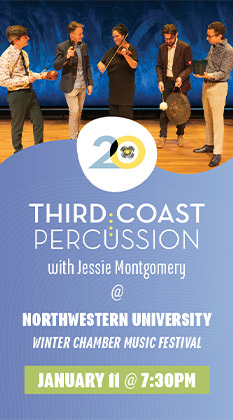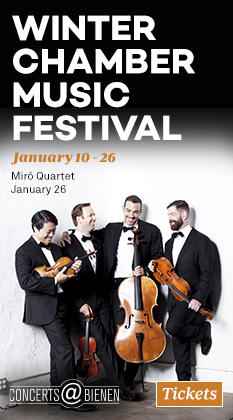With Emma Kirkby, Baroque Band launches fifth season in delightful fashion

Baroque Band kicked off its fifth season in style Wednesday night with an engaging program spotlighting one of the leading Baroque singers of the past three decades, Dame Emma Kirkby.
Kirkby’s bright red hair and cherubic smile were a perennial feature of 1980s period-instrument albums, particularly her many recordings with Christopher Hogwood and the Academy of Ancient Music.
The English soprano’s voice remains in superb repair and, clad in a verdant green gown, the still-youthful singer looked like a Shakesperean fairy aunt as she performed with conductor Garry Clarke and Baroque Band Wednesday night in Symphony Center’s Grainger Ballroom.
The curtain-raiser, Pergolesi’s Salve Regina, served as a fine calling card. There is a simplicity and immediacy of expression in Kirkby’s art that is hard to resist and this music fits her bright pure-toned soprano like a glove. She brought pinpoint articulation and expressive poise to Pergolesi’s setting, unfazed by a loud siren screaming down Michigan Avenue near the end. Likewise, her performance of Buxtehude’s lilting Dixit Dominus Domino meo, showed a graceful expression, flexiblility and notable ease in the top tessitura.
Kirkby was at her finest in four excerpts from John Christopher Smith’s Paradise Lost. Born in Ansbach, Germany as Johann Zoffany, he later moved to England and anglicized his name. Smith is still best known today as Handel’s copyist rather than as a composer in his own right.
Clearly, we’ve been missing something since this sampler of Smith’s music showed a gifted and stylish composer who writes with facility for voice with attractive melodic invention.
It helped immensely, of course, to have Emma Kirkby as an advocate. Prefacing the arias with her witty and informal introduction, the soprano brought her communicative personality and radiant vocalism to this music. She conveyed the spiritual joy of Bounteous providence divine, spaciously floated the relaxed languor of Time with slowest pace will move and touchingly rendering the dignified tragedy of Ah! Nuptial bower. The sensitive, responsive accompaniment of Clarke and his colleagues was on the same first-class level as their soloist.
Vivaldi’s In Furure justissimae irae, the opening section of his Motet in C minor, was clearly intended as a slam-bang finish and largely accomplished that. If not quite dispatched with the dazzling agility of years past, Kirkby’s technique remains estimable and she showed she can still throw off the fireworks of this Baroque showpiece with aplomb.
Kirkby closed with an encore of what has become something of a signature piece for her, Vivaldi’s Nulla in mundo pax sincera, rendered with lilting grace and a radiant simplicity that is truly the art that conceals art.
Clarke and Baroque Band interstitched the vocal selections with a buoyant account of the Overture to Maurice Greene’s opera Phoebe and Vivaldi’s Sinfonia in C, RV IIIa, in which the animated Clarke drew fizzing playing in the rambunctious outer movements.
Clarke must have scheduled extra rehearsal time for this concert, because the ensemble proved as tight and gleaming as I’ve ever heard it with none of the intonation issues that often bedevil the group’s violins. With no disrespect to Baroque Band’s founder, the ensemble sounds like a much more polished and cohesive group when the artistic director cedes the first-violin position to Jeri-Lou Zike and concentrates his full attention on conducting, which Clarke did with terrific vigor and spirit Wednesday night.
This is a choice opportunity to hear one of the world’s finest Baroque stylists in a rare Chicago appearance and one no vocal aficionado should miss.
The program will be repeated 7:30 p.m. Friday at the Music Institute of Chicago in Evanston and 7:30 p.m. Saturday at Augustana Lutheran Church in Hyde Park. baroqueband.org; 312-235-2368.
Posted in Uncategorized




Posted Oct 14, 2011 at 12:30 am by Roland Buck
Unfortunately there appears to be no recording of Christopher Smith’s Paradise Lost available. The excellent excerpts included in this performance indicates that there is a major need for this work to be recorded by someone.